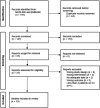COVID-19 vaccination in patients with cancer receiving immune checkpoint inhibitors: a systematic review and meta-analysis
- PMID: 36746512
- PMCID: PMC9905786
- DOI: 10.1136/jitc-2022-006246
COVID-19 vaccination in patients with cancer receiving immune checkpoint inhibitors: a systematic review and meta-analysis
Abstract
Background: Immune checkpoint inhibitors (ICI) can cause off-target inflammatory and immune-related adverse events (irAE). Conceivably, COVID-19 vaccination could trigger an inflammatory and immune response that could induce or aggravate irAE.
Methods: The objective of this systematic review is to appraise the efficacy and safety of COVID-19 vaccination in patients with cancer treated with ICI. The literature search was performed in PubMed and Embase in English from December 2019 to February 2022. The review included clinical trials, observational cohort studies, case series, and case reports reporting on the clinical efficacy and safety of COVID-19 vaccines on patients with cancer treated with ICI. Outcomes of interest included seroconversion, SARS-CoV-2 infection rate, severe COVID-19, COVID-19 mortality rate. Incidence of ICI irAEs was also ascertained as well as vaccine adverse events. A meta-analysis was conducted to estimate the pooled effect sizes of the outcomes when possible, using random effects models.
Results: Overall, 19 studies were included for the analysis (n=10 865 with 2477 receiving ICI). We analyzed 15 cohort studies, 1 cross-sectional study, and 3 case reports. There were no statistically significant differences in seroconversion rates after the second dose of the vaccine when comparing patients with cancer receiving ICI with patients without cancer (risk ratio, RR 0.97, 95% CI 0.92 to 1.03) or with patients with cancer without active treatment (RR 1.00, 95% CI 0.96 to 1.04). There was a higher probability of seroconversion in patients with cancer treated with ICI compared with patients with cancer treated with chemotherapy (RR 1.09, 95% CI 1.00 to 1.18). In a single study in patients receiving ICI, no differences were observed in risk of irAE between those receiving inactivated vaccine and those unvaccinated (pneumonitis RR 0.88, 95% CI 0.33 to 2.3; rash RR 1.03, 95% CI 0.66 to 1.62; arthralgia RR 0.94, 95% CI 0.51 to 1.75). There were no studies for other types of vaccines comparing vaccinated vs not vaccinated in patients treated with ICI. The most common vaccine-related adverse events were local pain or fatigue. Overall, the quality of evidence was rated as very low.
Conclusion: COVID-19 vaccination appears to be effective and safe in patients with cancer receiving ICI.
Keywords: COVID-19; Cytotoxicity, Immunologic; Immunogenicity, Vaccine; Immunotherapy; Vaccination.
© Author(s) (or their employer(s)) 2023. Re-use permitted under CC BY-NC. No commercial re-use. See rights and permissions. Published by BMJ.
Conflict of interest statement
Competing interests: The authors declare that the research was conducted in the absence of any commercial or financial relationships that could be construed as a potential conflict of interest. MES-A has received consultant fees in the past 12 months from Pfizer, Eli Lilly and Bristol Myers Squibb/Celgene unrelated to this study.
Figures




Similar articles
-
Immune-Related Adverse Events Among COVID-19-Vaccinated Patients With Cancer Receiving Immune Checkpoint Blockade.J Natl Compr Canc Netw. 2022 Oct;20(10):1134-1138. doi: 10.6004/jnccn.2022.7048. J Natl Compr Canc Netw. 2022. PMID: 36240845 Free PMC article.
-
Safety of COVID-19 vaccines in subjects with solid tumor cancers receiving immune checkpoint inhibitors.Hum Vaccin Immunother. 2023 Dec 31;19(1):2207438. doi: 10.1080/21645515.2023.2207438. Epub 2023 May 9. Hum Vaccin Immunother. 2023. PMID: 37157982 Free PMC article.
-
A randomized, double-blind, placebo-controlled phase III clinical trial to evaluate the efficacy and safety of SARS-CoV-2 vaccine (inactivated, Vero cell): a structured summary of a study protocol for a randomised controlled trial.Trials. 2021 Apr 13;22(1):276. doi: 10.1186/s13063-021-05180-1. Trials. 2021. PMID: 33849629 Free PMC article.
-
Indications for and contraindications of immune checkpoint inhibitors in cancer patients with COVID-19 vaccination.Future Oncol. 2021 Sep;17(26):3477-3484. doi: 10.2217/fon-2021-0288. Epub 2021 Jun 30. Future Oncol. 2021. PMID: 34189948 Free PMC article. Review.
-
Influenza vaccination in cancer patients receiving immune checkpoint inhibitors: A systematic review.Eur J Clin Invest. 2021 Jul;51(7):e13604. doi: 10.1111/eci.13604. Epub 2021 May 31. Eur J Clin Invest. 2021. PMID: 34021591 Free PMC article.
Cited by
-
Current Technologies and Future Perspectives in Immunotherapy towards a Clinical Oncology Approach.Biomedicines. 2024 Jan 18;12(1):217. doi: 10.3390/biomedicines12010217. Biomedicines. 2024. PMID: 38255322 Free PMC article. Review.
-
SARS-CoV-2 infection and COVID-19 vaccination in cancer patients undergoing immune checkpoint inhibitors.Cell Death Dis. 2023 Jun 30;14(6):390. doi: 10.1038/s41419-023-05922-w. Cell Death Dis. 2023. PMID: 37391394 Free PMC article. Review.
-
Impact of COVID-19 vaccination on cancer patients: safety, efficacy, and long-term effects.Support Care Cancer. 2025 Aug 4;33(8):753. doi: 10.1007/s00520-025-09783-1. Support Care Cancer. 2025. PMID: 40760361 Review.
-
mRNA vaccines against SARS-CoV-2 induce divergent antigen-specific T-cell responses in patients with lung cancer.J Immunother Cancer. 2024 Jan 4;12(1):e007922. doi: 10.1136/jitc-2023-007922. J Immunother Cancer. 2024. PMID: 38177076 Free PMC article.
-
Periodic Boosters of COVID-19 Vaccines Do Not Affect the Safety and Efficacy of Immune Checkpoint Inhibitors for Advanced Non-Small Cell Lung Cancer: A Longitudinal Analysis of the Vax-On-Third Study.Cancers (Basel). 2025 Jun 11;17(12):1948. doi: 10.3390/cancers17121948. Cancers (Basel). 2025. PMID: 40563598 Free PMC article.
References
-
- Organization WH . COVID-19 vaccine tracker and landscape: World Health organization; 2022, 2022. Available: https://www.who.int/publications/m/item/draft-landscape-of-covid-19-cand... [Accessed Aug 2022].
Publication types
MeSH terms
Substances
Grants and funding
LinkOut - more resources
Full Text Sources
Medical
Miscellaneous
